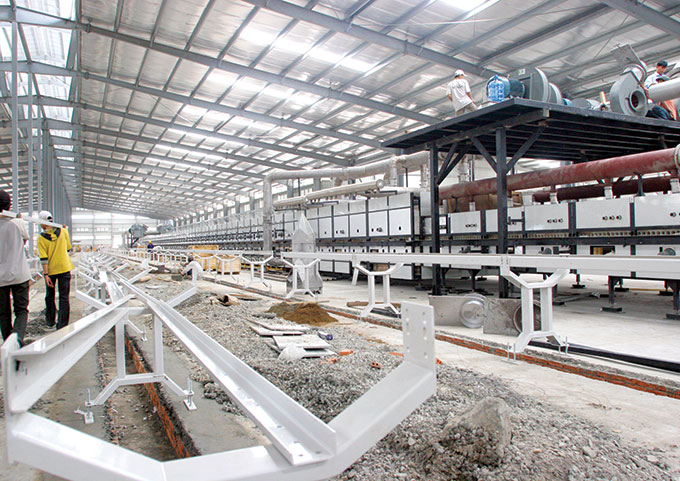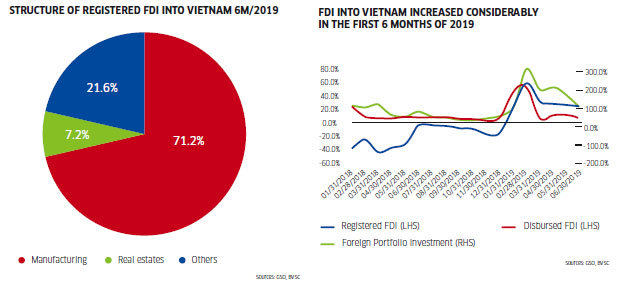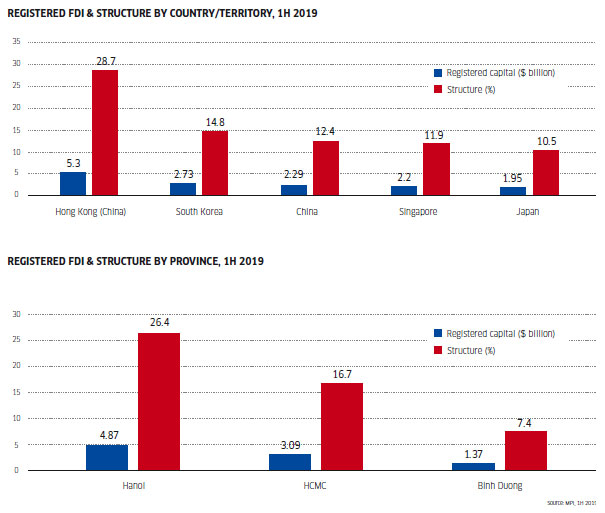
(Photo: Viet Tuan)
The MCE Group from the Netherlands revealed its investment of $250 million in southern Binh Phuoc province’s cashew industry at a meeting with provincial leaders in mid-June. The group will build a cashew nut shell liquid factory, which covers 10 ha in Duc Lieu commune, Bu Dang district, and develop a 190-ha organic cashew plantation in Duc Lieu in order to provide clean, high-quality cashew nut products for export. Mr. Marco Trimborn, Co-founder of the MCE Group, told VET that he sees benefits for both Vietnam and the Netherlands by stimulating Binh Phuoc’s economy. The project aims to assist Vietnam by developing sustainable cashew nuts in the long term and the Netherlands by presenting an opportunity to act as a hub to bring internationally-branded cashew nuts from the province to other European wholesalers.
According to a socioeconomic report for the first five months of 2019 released by the Foreign Investment Agency (FIA) at the Ministry of Planning and Investment (MPI), other foreign investments in the period included a capital contribution and share purchase by Beerco Limited from Hong Kong (China) in the Vietnam Beverage Co., with a capital contribution of $3.85 billion, ACTR’s steel radian tire manufacturing project in southern Tay Ninh province with total registered capital of $280 million, and the Scatec Solar Group’s renewable energy project with total capital of $500 million.
Vietnam remained an attractive market for FDI in the first half of the year. “This is thanks to changes in government policy and innovative measures to attract FDI,” Dr. Vo Tri Thanh, Head of the Institute for Brand and Competitiveness Strategy (BCSI), told VET.
Notable growth
According to MPI's latest report, total newly-registered and additional capital and capital contributions and shares purchased by foreign investors stood at $18.47 billion in the first half of 2019, down 9.1 per cent against the same period of 2018. Notably, figures in the first five months show that FDI into Vietnam recorded highest since 2015. Total newly-registered and additional capital and capital contributions and shares purchased by foreign investors stood at $16.74 billion in the period, up 69.1 per cent year-on-year and the highest in four years. The result is largely due to the US-China trade tensions, Mr. Nguyen Duc Thanh, Director of the Vietnam Institute for Economic and Policy Research (VEPR), said at the release of VEPR’s “Vietnam Annual Economic Report 2019: On the Doorstep of the Digital Economy” on May 29 in Hanoi.
Notably, FDI from China into Vietnam increased strongly in the first six months, with newly-registered FDI capital of $2.29 billion, an increase of 87.1 per cent compared to $833.9 million in the same period of 2018, according to the FIA. This is also the first time newly-registered FDI from China took the lead among all countries and territories. “The growth in FDI inflows from China was expected given the impact of the ongoing US-China trade tensions, with many Chinese enterprises seizing the opportunities from Vietnam’s participation in many new-generation free trade agreements (FTAs),” Dr. Oliver Massmann, General Director of Duane Morris Vietnam LLC, told VET.
Among the 19 sectors receiving investment in the first six months, manufacturing and processing grew the fastest, reaching nearly $13.15 billion and accounting for 71.2 per cent of all capital, followed by real estate with $1.32 billion, accounting for 7.2 per cent.
The record FDI flows have also resulted from positive economic developments, with the Vietnamese Government committed to creating favorable conditions for foreign investors and enterprises, in addition to the prospects from FTAs that take effect this year and in the near future.

Expansion expectations
With the record figures in the first half, FDI is expected to continue to grow robustly over the remainder of the year. The main sources behind FDI growth will be South Korea, China, Taiwan (China), and Hong Kong (China), according to the latest report from Bao Viet Securities Company (BVSC), released in June. South Korea, with its “New Southern Policy” and strong commitments from the country’s major tech giants, such as Samsung and LG, continues to view Vietnam as an attractive destination for investment. The Vietnam-South Korea FTA signed in 2015 has been a key facilitator of bilateral trade relations. “We don’t expect Samsung will open a new phone assembly factory in Vietnam in the short term, but satellite enterprises in the supply chain of Samsung or LG will follow or plan to increase production in the country,” according to the report. “FDI flows into Vietnam still have many opportunities to increase in the near future.”
BVSC forecast that companies in labor-intensive industries, such as textiles, footwear, toy-making, and others from China and Taiwan will speed up their investments in Vietnam, as the US is expected to impose the next round of import tariffs on such products, of 25 per cent.
FDI flows from other partners such as Japan, Thailand, and Singapore are also expected to increase but mainly via capital contributions and share purchases in M&A deals, aimed at accessing Vietnam’s growing domestic market, according to BVSC.
However, Dr. Massmann said the EU has long been among Vietnam’s leading FDI partners and, in the long run, to take advantage of the EU-Vietnam FTA, EU investors can prepare themselves by establishing a presence in the country. Heavy industry has attracted 180 FDI projects capitalized at nearly $4.2 billion, followed by oil and gas exploitation with 19 projects worth $2.5 billion. EU investments in the service sector accounted for about 40 per cent of total project numbers and 42 per cent of total capital. He added that US businesses investing in China are also intending to shift their investments, and Vietnam is well and truly on the radar. The BVSC report explained that Vietnam’s advantages as an alternative investment destination to China come from its strategic location, in the center of ASEAN, and its more than 3,000 km of maritime routes. Its proximity to China also allows manufacturers to move parts of their production chain across the border while maintaining a close connection with key assembly hubs in China. Vietnam has also been pushing infrastructure development, with a growing number of expressways and ports. More importantly, it has been integrating into global trade under various multilateral and bilateral trade agreements.

Its current advantages are the reason German businesses in Vietnam assess both their own production and business situation and future business expectations as being significantly better this year than in 2018, according to a survey of members of the German Chambers of Commerce Abroad (AHKs) released on June 20. Seventy-seven per cent of German companies in the country had a positive view of their situation and 72 per cent believe the next 12 months will be even better. Fifty-five per cent intend to expand their investment and 59 per cent assume an increase in employment over the next 12 months.
But Vietnam needs to improve its economic policy framework in the next 12 months, which is considered the major problem by these German companies. According to the survey, half of respondents cite economic policy as the greatest risk to their business. Other issues include a lack of qualified workers (according to 44 per cent of respondents) as well as labor costs (31 per cent). Mr. Marko Walde, Chief Representative of German Industry and Commerce Vietnam, said German investment in Vietnam is not huge in terms of FDI projects, but in the long term they hope to build tight cooperation with local partners, helping Vietnamese enterprises to enhance their competitiveness and sustainable development.
Dr. Thanh from BCSI said that due to the impact of the digital economy, the government will continue to adopt new policies to attract FDI, focus on high technology, encourage technology transfer and links with domestic enterprises, especially small and medium-sized enterprises (SMEs), and implement sustainable development measures associated with environmental protection. “FDI plays a very important role in Vietnam’s economy, so in addition to internal reforms, Vietnam needs to take advantage of opportunities to attract more FDI in the time to come,” he added.


















